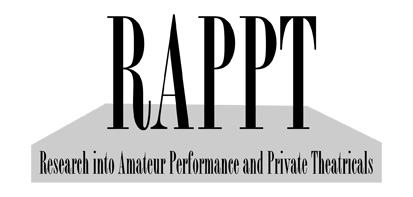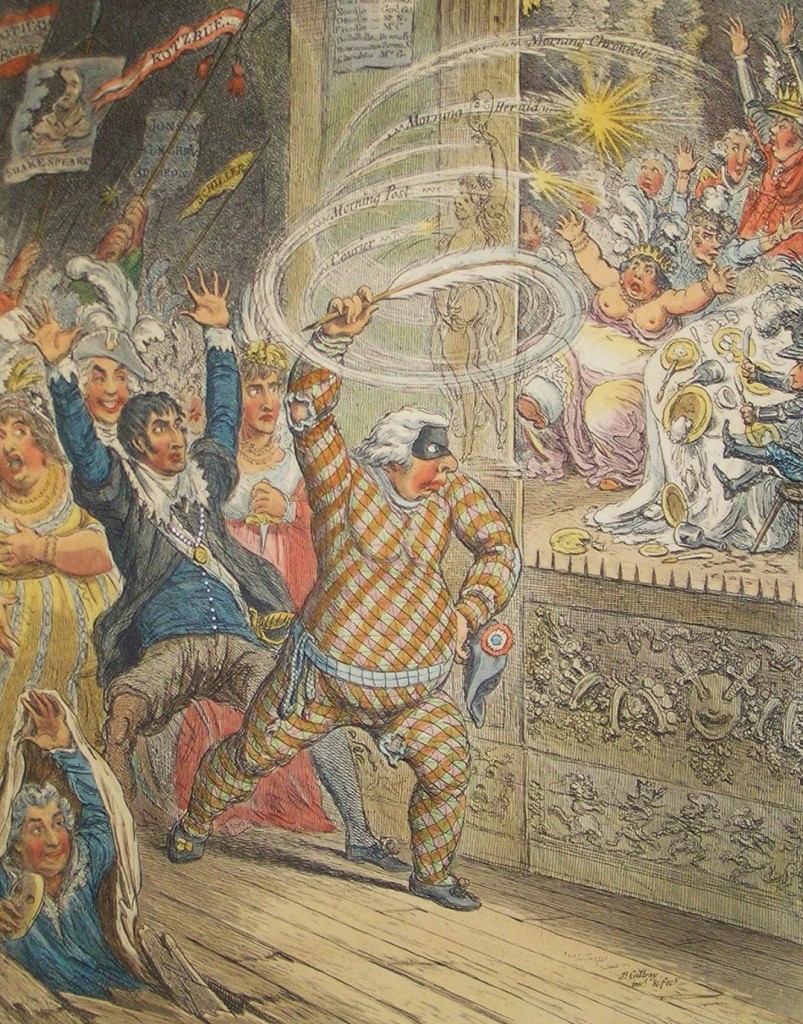RAPPT 2016
Community as Beneficiary: The Role of Amateur Performance
Saturday & Sunday July 9th and 10th
Hosted by the
Department of Drama and Theatre Studies
University College Cork
We are delighted to announce that the RAPPT 2016 conference registration is now open. To register please go to this link to purchase your conference tickets.
- Full delegate fee: £90
- Concessionary delegate fee, for the unwaged: £80.
This covers attendance at all events for two days.
Light refreshments served on both mornings and at the evening reception. Unfortunately, lunch is not included in the delegate fee but we are hopeful of securing a special lunch deal at a nearby restaurant, where space can be made available for large groups. A list of recommendations for places to eat in the evening will be available in the conference pack.
You can collect your conference tickets at the registration desk (Connolly Room, Dept. of DTS, UCC between 9am and 9.30am, Saturday July 9th.
You may view the draft programme at this link and the conference abstracts at this link.
RAPPT 2016
Community as Beneficiary: Endorsing the Relevance of Amateur Performance
The 2016 conference will be hosted by the Drama and Theatre Studies Department, University College Cork, Ireland, July 9th and 10th 2016
Conference Organisers: Dr. Fiona Brennan and Dr. Marie Kelly, Head of Drama and Theatre Studies
Cork City boasts a particularly vibrant contemporary theatre community. Based on available records, Cork’s theatrical tradition stretches back to 1713 when a malthouse room on Kyle Street was converted into a temporary theatre. The amateur theatrical tradition has made a significant contribution to the City’s theatrical heritage. 2016 marks the centenary of the birth of James N. Healy, one of the foremost leaders of Cork’s traditional amateur community and the 70th anniversary of the founding of the Cork City Amateur Drama Festival.
The keynote address will be given by Dr. Ger FitzGibbon, former Head of the Department of Drama and Theatre Studies, UCC. Dr. FitzGibbon’s work in academia and theatre practice is widely acknowledged and his contribution to theatre and performance studies widely acclaimed.
The conference will address non-professional/amateur performance across periods, in both private and public capacities. It will present research on the relevance of amateur/non-professional performance and practice within the community: i.e., rural and/or urban locales; social and cultural; archaeological; anthropological; geographical; ethnic; national; etc.
We welcome papers on any aspect of amateur/ non-professional performance, but particularly those relevant to the conference theme. Topics can include:
- The important contributions by amateur/non-professional performance to the development of artistic standards
- Spectacle, entertainment and spirit in play within communities
- The role/relevance of amateur/non-professional theatre in the transition to the professional stage
- Tensions between the amateur/non-professional and professional communities
- Private theatricals and the aristocratic community
- Amateur/non-professional theatre in terms of social, cultural, historical, educational identities
- Amateur/Non-professional performance and nationhood.
Please submit proposals of 300 words by April 30th 2016 to: rappt2016@gmail.com. You are welcome to address any queries and/or statements of interest to Fiona Brennan at the email address provided. Please include with your proposal:
Name and Affiliation
Email Address
Postal Address
Telephone Number
A/V Requirements
Special Requirements.
Accommodation.
Conference proceedings will be held at the Drama and Theatre Studies’ Department, which is situated on the Western Road, Cork City. The area offers a wide variety of accommodation: 3, 4, 5 star guesthouses and hotels; hostel and student accommodation, which are in walking distance of the DTS Department. For further assistance you can contact Fiona Brennan.
Conference fee.
Bearing in mind that the association currently has no source of income, this year’s conference fee is likely to be £95 sterling. The cost will include attendance at all daytime events; teas, coffees and a drinks’ reception on Saturday evening. Unfortunately, it does not include lunches/dinners. There are a range of eateries nearby (reasonable prices). The conference organisers will endeavour to secure the best rates possible.
Payment facilities will be made available by Royal Holloway, University of London.
Please note: The Society for Theatre Research (UK) is inviting applications for funding for the academic year 2015-2016. Closing date is March 25th 2016. The STR has supported attendance at conferences in the past. Please bear in mind the actual criteria when applying: for example, please apply for research and travel costs rather than subsistence.
Please see http://str.org.uk/research/awards/index.html.
RAPPT 2014
Paying the Piper: Economies of Amateur Performanc
Registration is now open for our inaugural conference, “Paying the Piper: Economies of Amateur Performance,”which will run from June 28-29, 2014 at the London home of the University of Notre Dame, located just off Trafalgar Square. This conference will showcase the results of two RAPPT projects currently underway: 1) a digital archive of the Pic Nic Society (arguably the first amateur dramatic society in England), which will serve as a digital dramaturgy site for 2) an amateur production of one of the plays that members of the society performed at the Tottenham Street Theatre in 1802. Our goal is to situate this research into conversations about the economies of non-professional performance across periods and locations. In drafty church halls and lavish ballrooms, on board ships, in parlours and in purpose built spaces, lovers of the performing arts have long collaborated creatively without the sanction of academic or professional recognition. Yet not-for-profit performance still has a cost. The extravagance of the Earl of Barrymore’s theatricals at Wargrave practically bankrupted him and, as the Pic Nic controversy demonstrates, the fashion for private performance was, at the very least, perceived as a financial threat to London’s patent theaters
CFP
This conference will showcase the results of two RAPPT projects currently underway: 1) a collaboratively curated digital archive of the Pic Nic Society, which will serve as a digital dramaturgy site for 2) an amateur production of one of the plays that members of the society performed at the Tottenham Street Theatre. Our goal is to situate this research into conversations about the economies of non-professional performance across periods and locations. In drafty church halls and lavish ballrooms, on board ships, in parlours and in purpose built spaces, lovers of the performing arts have long collaborated creatively without the sanction of academic or professional recognition. Yet not-for-profit performance still has a cost. The extravagance of the Earl of Barrymore’s theatricals at Wargrave practically bankrupted him and, as the Pic Nic controversy demonstrates, the fashion for private performance was, at the very least, perceived as a financial threat to London’s patent theaters.
We invite papers on any aspect of non-professional performance, but particularly those that investigate:
- The cost and funding of amateur performance;
- The role of commercial publishers and theatrical suppliers in feeding the craze for amateur theatricals;
- The involvement of professional performers in amateur productions;
- Rivalries and tensions between professionals and amateurs;
- amateur performance in the context of a funding crisis in the humanities
Please submit proposals of 250-500 words electronically (doc or pdf) by March 7, 2014 to rappt2014@gmail.com. Queries and statements of interest welcome to the conference address or individually to conference organizers Judith Hawley (j.hawley@rhul.ac.uk) and Mary Isbell (mary.isbell@yale.edu) Please include with your proposal:
- Name and Affiliation
- Email Address
- Postal Address
- Telephone Number
- A/V Requirements
——————————————
Amateur Production
Interdisciplinary Approaches to Nonprofessional Practices
A seminar at the 45th Annual Convention of the Northeast Modern Language Association (NeMLA)
April 3-6, 2014 in Harrisburg, Pennsylvania, hosted by Susquehanna University
deadline September 30, 2013
Seminar chair: Mary Isbell (Yale University)
Please include with your abstract:
Name and Affiliation
Email address
Postal address
Telephone number
A/V requirements (if any; $10 handling fee with registration)
The 2014 NeMLA convention continues the Association’s tradition of sharing innovative scholarship in an engaging and generative location. This capitol city set on the Susquehanna River is known for its vibrant restaurant scene, historical sites, the National Civil War museum, and nearby Amish Country, antique shops and Hershey Park. NeMLA has arranged low hotel rates of $104-$124.
The 2014 event will include guest speakers, literary readings, professional events, and workshops. A reading by George Saunders will open the Convention. His 2013 collection of short fiction, The Tenth of December, has been acclaimed by the New York Times as: “the best book you’ll read this year.” NeMLA’s Keynote Speaker will be David Staller, Producer and Director of Project Shaw. Mr. Staller presents monthly script-in-hand performances of Bernard Shaw’s plays at the Players Club in New York City.
Interested participants may submit abstracts to more than one NeMLA session; however, panelists can only present one paper (panel or seminar). Convention participants may present a paper at a panel and also present at a creative session or participate in a roundtable. http://www.nemla.org/convention/2014/cfp.html
——————————————
Plays, Places and Participants – light opera, dance and theatre around 1800
Trondheim, November 4th-6th, 2013 (deadline for submissions August 1st)
Around the turn of the 19th century, dance, music and theatre as performing arts were going through major changes with regards to repertoire, venues and agents. Genres shifted from baroque patterns and classicistic ideals to romantic and new popular forms; performance sites moved from the town hall, via private parlours and stately homes, to public assembly rooms and purpose-built theatres; practitioners ranged from self-fashioning dilettantes united by social acquaintance or organized societies, to professional performers and managers. As artistic forms and venues changed, so did the performing arts’ aesthetic and social functions.
This conference aims to focus on the repertoires, venues and agents that were part of the development of the performing arts in the decades between 1770 and 1850. An important aspect of the conference will be how the genres and styles within the various art forms underwent a transition from baroque to romantic ideals: from aristocratic, representative forms towards an art that reflected enlightenment ideals and a new self-understanding among the bourgeois participants.
Performing arts are actual events in time and space – and therefore inextricably linked to the physical venues and locales where performances took place. These were the places where people assembled to dance, act, play and sing; to present and represent; to practice and participate in the making of art and the making of society. The conference theme Plays, Places and Participants, is therefore an invitation to contributors to address:
• Genres and styles; scripts, scores and notations
• Performance spaces and technologies
• Artistic and social conventions and practices, where questions of gender constitute a significant research perspective

